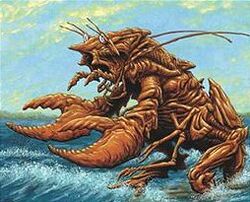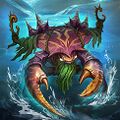Homarid
| Homarid | |
|---|---|
| Creature Type | |
| (Subtype for creature/kindred cards) | |
| Introduced | Fallen Empires |
| Last used | Outlaws of Thunder Junction |
| Beeble Scale | 8[1] |
| Scryfall Statistics | |
|
8 cards | |
Homarid is a creature type for cards that depict sapient lobster-like creatures that thrive in cold water.
Description
Homarids resemble large, eight-legged, bipedal lobsters between five and seven feet in height, although some homarids are crab- or crayfish-like in appearance, possibly representing different subraces (some earlier card art depicted them with only four legs).[2] Some, such as the deep spawn and viscerid deepwalkers, are much larger and less humanoid. Homarid warriors wield crude clubs or spears made of wood or coral; the later viscerids would remove the shells from their fallen comrades to wear as armor. Homarids appear to have a primitive animistic religion; homarid shamans were known to flood the forests of their elven enemies using elemental magic.
Homarids do not incubate their eggs individually. Instead, they bring them to a central location and share the responsibility with others, promoting better care and security.[3] Homarid infants are called Camarids.
Creature type change
After Naga had been incorporated into the Snake type and Cephalids into the Octopus type, it was discussed if homarids and camarids should retain their creature type or should be incorporated in the Crab or Lobster type.[4] So far, no action has been taken but Mark Rosewater expects that Homarid will be retired as a creature type if Creative choose to use them in a new premier set.[5][6]
Storyline
Originally native to the waters of Dominaria's unnamed antarctic continent, the homarids migrated northward in the centuries after the Brothers' War as global cooling took hold on the world. Eventually, the homarids came into conflict with the merfolk of Vodalia off the continent of Sarpadia, hastening that empire's fall. They also seem to have menaced the elves of Havenwood.
In the wake of the Sylex Blast, the tectonic plate extending from Argoth southwards from Terisiare was completely shattered, creating a massive trench running north-south between Terisiare and Sarpadia. After the fall of Vodalia, the homarids discovered this trench, whose cold, dark water provided them a welcome haven and northward migration route.
Viscerid offshoot
Shortly after the Ice Age ended, the homarids came into contact with the human civilizations of Terisiare. The creatures were named viscerids by the Kjeldorans, as they were first spotted emerging from the Visceral Sea.[7][8] The viscerids were a minor threat during the Flood Age due to their habit of blocking rivers with makeshift dams and causing widespread flooding, possibly as a means to create inland habitats from which to raid human settlements. During this time, the viscerids conflicted with the merfolk of Etlan Shiis, who sought to avenge fallen Vodalia, and whose benthic explorers tracked their movements.
After the Ice Age
When Dominaria's climate finally began to warm again, the homarids in the trench between Terisiare and Sarpadia adapted to the rising temperatures. Their presence disrupted deep-sea travel between the northern and southern hemispheres, making travel through the tropics extremely dangerous for merfolk and other aquatic races.
Notable Homarids
Gallery
-
A Homarid shaman from Magic: Legends.
-
A Homarid warrior from Magic: Legends.
Trivia
- The silver-bordered Old Fogey has protection from Homarids.
References
- ↑ Mark Rosewater (August 22, 2019). "Where are the noble and mighty homarids on the beeble scale?". Blogatog. Tumblr.
- ↑ Ben Bleiweiss (February 6, 2002). "Under the Sea". magicthegathering.com. Wizards of the Coast. Archived from the original on September 30, 2022.
- ↑ Magic: The Gathering 1997 Calendar: 365 Days in Dominia
- ↑ Mark Rosewater (November 3, 2023). "What's the likelihood of homarids & camarids being changed to crab?". Blogatog. Tumblr.
- ↑ Mark Rosewater (May 10, 2024). "With Viashno no longer in use… are Homarids in danger?". Blogatog. Tumblr.
- ↑ Mark Rosewater (June 24, 2024). "Why weren’t Homarid changed to Crabs or Lobsters when Cephalids changed to Octopus?". Blogatog. Tumblr.
- ↑ Magic Arcana (April 18, 2002). "Homarid Armor". magicthegathering.com. Wizards of the Coast. Archived from the original on April 29, 2021.
- ↑ Loreley Weisel-Librizzi (October 21, 2022). "Map update!". Twitter.


